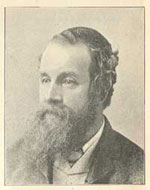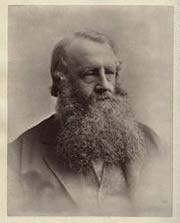
John Makinson Fox
Why I Oppose Vivisection
「1895-Oct」 Dr. John Makinson Fox, “Why I Oppose Vivisection, No. 10,” Animals’ Friend 2 「Google Books」 (1896 Sep): 12-14.
「As」 lovers of animals 「as well as」 interested in the advancement of the science of healing…there has been an absence of the principle ‘Put yourself in his place’ in the way in which 「the vivisection」controversy has been conducted.
By what law of God or nature has one highly organized being the right to subject to what has been called ‘the tortures of the damned’
another equally sensitive creature; the principal difference being, in the inferior animal, an absence of the power of appeal and self–protection?
It is from the teaching of history that I am led to think that the practice of vivisection will eventually be abandoned as one of which we ought to be ashamed.
I do not know that I have received one atom of benefit on behalf of my patients for all the cruelty which I witnessed. I maintain that no useful end has been attained by this practice, and that by far the larger number of experimental tortures are inflicted for no practical or useful purpose.
Let people regard their bodies as very delicate and sensitive mechanism, needing intelligent treatment and watchful care ; let them study the laws of health and abide by them, avoiding excess and unnatural living and strain; let them keep their bodies and dwellings clean and pure and attend to the elementary laws of sanitation, and they will do more for the obliteration of sickness and disease than my profession can, for we are daily trying to undo the harm people are hourly doing themselves.
_________
WHY I OPPOSE VIVISECTION.No. 10.
—BY JOHN MAKINSON FOX, M.R.C.S.
VIVISECTION is a subject which cannot fail in a double respect to interest society generally. First, we are all more or less lovers of animals; and second, we are all none the less interested in the advancement of the science of healing. It has always appeared to me that there has been an absence of the principle “Put yourself in his place” in the way in which this controversy has been conducted. Those who have written in opposition to vivisection have usually written from the point of view that all who practise vivisection are possessed only of cruel and blood-thirsty natures. On the other hand, those who favour vivisection have been too apt to treat those who oppose it with scorn and contempt, as though they were influenced by sentiment only, had no alliance with science and no acquaintance with inductive reasoning. Let kinder feelings prevail on both sides. Let it be possible for me to conceive that the vivisectionist is really one of the most humane of men, and is animated only by the most justifiable scientific motives. Similarly, let the vivisectionist think of those who entertain diametrically opposite views as persons who may have something to say for themselves, and who may be able to advance arguments worthy of consideration.
In regard to the highly sentient animals, I am not sure that the rule “Put yourself in his place” should not apply. By what law of God or nature has one highly organized being the right to subject to what has been called “the tortures of the damned”
another equally sensitive creature; the principal difference being, in the inferior animal, an absence of the power of appeal and self–protection? Is there no obligation of forbearance suggested or imposed by mutual enjoyment of the same sensibility? If keen enthusiasm for scientific discovery be so strong, why not let it rise to the height of martyrdom? If this were the case the vivisectionist would proudly submit his body (of course, under the protection of anæsthetics) to the scalpel of a brother experimenter. There may be still existing in this and other highly civilized countries persons of robust constitution who would think it right to revive the extortion of evidence by torture. Why not, if the end always justifies the means? It may be assumed that my vivisectionist friends would not be able to go so far as this. They would conceivably say that for no purposes of State or religion must torture be thus employed. Is it not possible for them to see that, by an extension of the same argument, conscientious objections may be entertained, and entertained most strongly, against the employment of experimental torture upon highly sentient creatures for any purpose whatever? It is from the teaching of history that I am led to think that the practice of vivisection will eventually be abandoned as one of which we ought to be ashamed.
The question is rapidly becoming, however, one of great danger to people themselves. They have given Science a free hand, they have bowed the knee and worshipped it, and is now fast becoming an organized tyranny. The way in which, at the present time, we are dragooned by anticipative scientists is rapidly leaving the ridiculous for the dangerous stage, and should be resisted by an intelligent community. At the present time, under official pressure, I am doing my utmost to make my dog mad by keeping him rigidly muzzled. Any one with a kind heart is rendered almost demented by the sight of his resistance to the curtailment of his liberty. A more innocent and amiable animal never lived, but under the local regulations of my country I am constrained to try and force him into hydrophobia by this wretched muzzling order, which is about as sensible and humane as the practice of vivisection.
We are told that, under the new–fangled system of sero–therapeutics, infectious disorders, even if not extinguished, shall war in vain against the bodies of persons protected by the inoculations of divers preventives. Are you in danger of contracting, or have you an infectious disorder? Then your new scientist will squirt through your skin a weak concoction of that very disorder, made in his laboratory, and, hey presto ! the dread demon knows you no more. The new scientists are always telling us what they have discovered, or are on the eve of discovering. Now, as a Medical Officer of Health to one of the largest districts in England, I have no reason to think that there is any one in the kingdom who has had more experience than I have had in dealing with infectious diseases among men and animals, and I affirm that I know of no discovery of any practical value which has assisted me in my official duties or in treating my patients. I have failed to see that the most useful science of pathology has advanced one single inch by means of vivisection. As I have always advocated, the proper school of pathology (that is, the science of disease) is the post mortem room, and the close observation of disease at the bedside of patients.
I have been acquainted with the practice of vivisection for upwards of forty years. I well remember the experiments which I first witnessed, performed under skilful hands, but which were thought by a select audience of medical men to be cruel and without sense or use. Pigeons were shaved, and their brains frozen and twirled about in all directions. My next experience was with dogs in the laboratory of a London hospital, where these defenceless creatures were cut about and injected with “stuffs”
to their terrible pain and suffering. And after forty years—what is the result ? I do not know that I have received one atom of benefit on behalf of my patients for all the cruelty which I witnessed. I maintain that no useful end has been attained by this practice, and that by far the larger number of experimental tortures are inflicted for no practical or useful purpose. They are academic, sensational, conjectural merely, and, in some cases, theatrical. Dr. Addison discovered a relation between a certain discolouration of the skin and an affection of the supra–renal capsules (situated above the kidneys) without any assistance from vivisection. The writer of this letter had the honour to be Dr. Addison’s clinical clerk when this discovery was matured in the post mortem room of Guy’s Hospital, not on the vivisector’s table. Nor is it clear that the connection existing between the disease known as myxcœdema and atrophy (wasting away) of the thyroid gland (in the throat) owes anything to vivisection; though, after the suggestion had been made, it then became the fashion to extirpate thyroid glands from all kinds of living animals.
It is not by any such unnatural procedures that valuable medical discoveries in the interests of humanity have been made. What is wanted is the rare intelligence and foresight of the discoverer. This may not be produced in every generation of every school, but it cannot be manufactured by any industrious multiplication of experimental tortures. The second requirement is a large and almost unbounded extension of opportunities of pathological research. It is an unfair Parliamentary obligation laid upon every member of the medical profession that he must furnish, gratuitously, a certificate of the cause of death of every patient that he may attend whose case may terminate fatally. There is no corresponding obligation that a post mortem examination should be made by the medical attendant or a specially appointed officer when there is reason to believe that issues of interest may be discovered or a doubtful diagnosis rendered clear. The late eminent Dr. Charcot, the chief European authority upon diseases of the nerves, was very emphatic on this point. Whenever he saw any symptoms of partial paralysis or any 「14」extraordinary capacity, say, for arithmetic, or music, or languages, or any entire absence of such capacity, he was seized with an insatiable longing to get hold of the brain of the person in whom he had noted the disease of abnormal faculty, or its absence, and search into its localization. Only a year or two ago there died, in the county of Lancashire, near to Blackpool, the too little known Dr. Charles Clay. His name may not be familiar to the British public, but it is well known by the medical profession that Dr. Charles Clay was the father of the surgical operation known as ovariotomy. I suppose that this operation, introduced sixty years ago (for Dr. Clay died at the age of 92 years) and taken up by Professor Lawson Tait, Sir Spencer Wells, and a host of others, has been the means of giving relief to an incalculable amount of human suffering, and has saved the lives of scores of women annually. What does this eminent benefactor to humanity say upon the subject of vivisection? In the Times of July 31st, 1880, he thus wrote: “I have come to London from the North of England expressly to bear my testimony in support of the total abolition of vivisection. As a surgeon I have performed a very large number of operations, but I do not owe a particle of my knowledge or skill to vivisection. I challenge any member of my profession to prove that vivisection has in any way advanced the science of medicine or surgery, or tended to improve the treatment of disease.”
Nothing can be added to this forcible testimony, which is weighty enough to make the most earnest supporters of vivisection give pause.
Let me, speaking with a full sense of responsibility, strongly impress upon the minds of my readers that our recent great advance in sanitation has done far more for public health than vivisection. For example, what has vivisection done for the suppression of any zymotic diseases ? It was not by vivisection that Dr. Jenner discovered the protective value of vaccination; nor was it by vivisection that Dr. Budd differentiated typhus and typhoid fever. My old friend, Dr. Addison, I believe, till the day of his death, never believed in this distinction, but he did not base his opinion upon the experiments or researches of vivisection. Let people regard their bodies as very delicate and sensitive mechanism, needing intelligent treatment and watchful care; let them study the laws of health and abide by them, avoiding excess and unnatural living and strain; let them keep their bodies and dwellings clean and pure and attend to the elementary laws of sanitation, and they will do more for the obliteration of sickness and disease than my profession can, for we are daily trying to undo the harm people are hourly doing themselves. Let us not unman ourselves by cruelty by way of escaping the penalties of our misdeeds. Let us not approximate to continental ideas of thought and action in regard to living animals, nor copy the methods of continental scientists, some of which are of the devil, devilish. We have gone some distance that way, but let us hurry back and be English. Let us pursue science by scientific, allied to humane, methods, and not by doing violence to every proper natural feeling.
Obituary.
DEATH OF DR. FOX.
It is with very deep regret that we have to announce the death of the author of the foregoing article, from pneumonia, at his residence, The Grove, Lymm, Cheshire, in his sixty-fourth year. The genial, kindly features, which are presented on another page, have now passed for ever from the sight of those who knew and loved him best. With the exception of a letter to the Manchester Guardian, of September 6th, the article in our present issue was his last contribution to the controversy, and is, literally, a voice from the grave. In his closing words he urges, “let us be English”
—which has, heretofore, been synonymous with all that was manly, self-sacrificing, and courageous. This was what Dr. Fox was, for he staunchly held by what he conceived to be his duty, despite the frowns of some of his medical brethren. And “being dead, he yet speaketh”
to all of us, to be English, to do our duty, to denounce the acquisition of personal and bodily gains wrung from the tortured and mutilated bodies of “the lower brethren.”
The courageous voice is now stilled, we shall see his face no more, but we shall remember him as a good and kindly man, not unworthy of his race, nor of his day and generation. May he rest in peace.
* These papers are written more particularly for the lay public.



